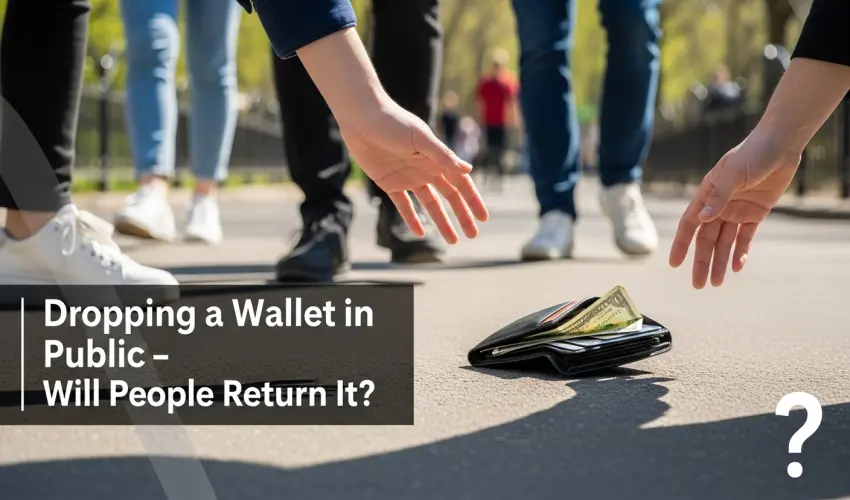The Lost Wallet Experiment: What a Global Study Reveals About Human Honesty
Ever lost your wallet? A groundbreaking global study reveals a surprising truth about human honesty: people are more likely to return a lost wallet if it contains cash. Dive into the psychology behind this counterintuitive act of kindness.
Key Takeaways
-
Contrary to popular belief, people are significantly more likely to return a lost wallet if it contains money.
-
A massive global study involving over 17,000 "lost" wallets across 40 countries revealed higher return rates for wallets with more cash.
-
Psychological factors, such as the desire to maintain a positive self-image as an honest person, play a crucial role in this behavior.
-
Cultural and societal norms have a measurable influence on the likelihood of a wallet being returned.
-
These findings challenge cynical assumptions about human selfishness and highlight the complexity of our moral decision-making.
Introduction: The Ultimate Test of Honesty
Imagine you're walking down a busy street and spot a wallet lying on the sidewalk. You pick it up, open it, and find cash inside. What do you do?
This simple scenario has been the basis for countless social experiments designed to gauge human honesty. One of the most extensive studies on this subject involved researchers "losing" over 17,000 wallets in public places across 40 countries. The goal was to see if people would attempt to return them and how the presence of money would influence their decision. The results were not what you might expect.
The Global Experiment: Methodology and Findings
In this large-scale study, researchers prepared thousands of transparent wallets. Each contained a grocery list, a key, and business cards with contact information. The variable was cash:
-
Some wallets had no money.
-
Some contained a small amount (equivalent to about $13.45).
-
Some contained a larger sum (equivalent to about $94.15).
Researchers would hand these wallets to employees at institutions like banks, post offices, and hotels, claiming they had just found them on the street and were in a hurry.
The Surprising Results
The findings consistently showed a striking trend:
-
Wallets with no money were returned 40% of the time.
-
Wallets with a small amount of money were returned 51% of the time.
-
Wallets with a large amount of money saw a return rate of 72%.
This pattern held true across the vast majority of countries, indicating a near-universal human tendency: the more money at stake, the higher the likelihood of its return.
Understanding the Psychology: Why More Money Means More Honesty
At first glance, these results seem counterintuitive. Why would more cash make someone less likely to keep a wallet? The answer lies in human psychology.
1. The Power of Self-Image
People generally strive to maintain a positive self-image. Keeping a wallet is a form of stealing, but keeping one with no money is easy to rationalize. However, keeping a wallet with a significant amount of cash forces a person to confront a difficult truth: they are a thief. The psychological cost of seeing oneself as dishonest often outweighs the financial gain. Returning the wallet preserves one's moral identity.
2. The Role of Empathy
The presence of a substantial amount of money may also trigger a stronger empathetic response. An individual might vividly imagine the distress and hardship the owner would feel upon losing a large sum, prompting them to return the wallet out of compassion.
3. The Influence of Social Norms
Societal norms dictate that returning lost property is the right thing to do. The fear of social judgment or the internal desire to adhere to these standards can be a powerful motivator.
Cultural Variations in Civic Honesty
While the overall trend was consistent, cultural differences did play a role in the baseline return rates.
-
Countries like Switzerland, Norway, and the Netherlands exhibited very high return rates, reflecting strong social trust and a sense of civic responsibility.
-
In contrast, countries like Peru, Morocco, and China had lower overall return rates, which could be attributed to different cultural norms and economic pressures.
These variations underscore how our immediate environment shapes our moral behavior, even if the underlying psychological drivers are universal.
Conclusion: A Hopeful Reflection on Human Nature
The act of returning a lost wallet serves as a powerful microcosm for understanding human morality. This groundbreaking study reveals that, contrary to cynical beliefs, people often choose honesty over personal gain, especially when the stakes are high. Factors like self-image, empathy, and social norms are powerful forces that guide us toward ethical behavior.
These insights not only reshape our understanding of human nature but also offer a hopeful glimpse into our collective capacity for building more trustworthy and cooperative societies.
Join the conversation
Share how this story resonates with your journey. We feature standout reflections in our newsletter.

